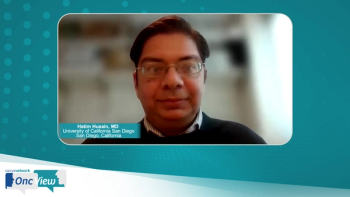
Testing for the EGFR Exon 20 Insertion
Zofia Piotrowska, MD, shares insight on testing strategies for EGFR Exon 20 insertions, and which patients should be tested for these alterations.
Episodes in this series

Mathew Fowler: Is exon 20 insertion something that a typical NGS [next-generation sequencing] panel looks for? If not, how should clinicians test for this gene alteration?
Zofia Piotrowska, MD: These are mutations that are picked up with typical DNA-based next-generation sequencing assays, so most of the multigene panels we’re using these days will detect these. The important thing is to be able to notice that an EGFR mutation has been discovered and that this specific EGFR mutation may not be the same as the more common exon 19 deletions and L858R point mutations. It’s important to read the report carefully and distinguish these different mutations.
Mathew Fowler: Which patients should be tested for this alteration, and when should they be tested? What are the factors that you look for in patients to ultimately lead to testing?
Zofia Piotrowska, MD: In 2021, broad molecular testing using a multigene next-generation sequencing panel should be the standard of care for all newly diagnosed patients with advanced non–small cell lung cancer, particularly those with nonsquamous histologies. Those panels should include EGFR exon 20 insertions. We used to think of looking for EGFR mutations as something that was most important in patients who were never smokers or have a light smoking history. That’s 1 of the factors that can predict for these mutations, but we’ve seen these mutations happen in patients with more significant smoking history. It’s important to do testing for all our patients. Ideally, that testing should be done at the time of initial diagnosis so that we can help select even the best first-line therapy for these patients.
Mathew Fowler: Could you talk about some of the barriers that exist to testing and the knowledge gaps in molecular profiling?
Zofia Piotrowska, MD: There are a few challenges. Molecular testing, even today, is still not as common as it should be. There are some barriers to getting the testing itself, so sometimes, especially when we’re looking at tissue-based testing, the tissue is exhausted and used up by the pathologist to establish the diagnosis. By the time we get to molecular testing, it may be fairly scant or insufficient for testing. In those cases, liquid biopsies or circulating tumor DNA can be a helpful adjunct and can be useful to do molecular testing. Although I always caution that when we’re using liquid biopsies or circulating tumor DNA, if the results don’t come back with an oncogene driver, it could be that tumor hasn’t shed enough DNA into the circulation to be detected—not because there’s no oncogene driver. We need to work closely with pathologists to make sure the tissue is used carefully, and as much as possible, to save for molecular testing. Thinking about the use of liquid biopsies is an important step that we can take to improve the rates of testing.
The other big category is waiting for test results and being able to appropriately interpret NGS reports to identify which mutations are present and to ensure that we’re selecting the right treatments for patients. I’ve seen in my own practice that that has gotten more complicated in recent years as we have new targeted therapies available for patients. Another challenge is that when we do get that report, what do the results mean? Where can we go to help distinguish? Is this an EGFR exon 20 insertion, exon 19 deletion? How do we interpret those reports to make the best decisions for our patients? That’s something as a community that we have to work on going forward.
Transcript edited for clarity.
Newsletter
Stay up to date on recent advances in the multidisciplinary approach to cancer.





































